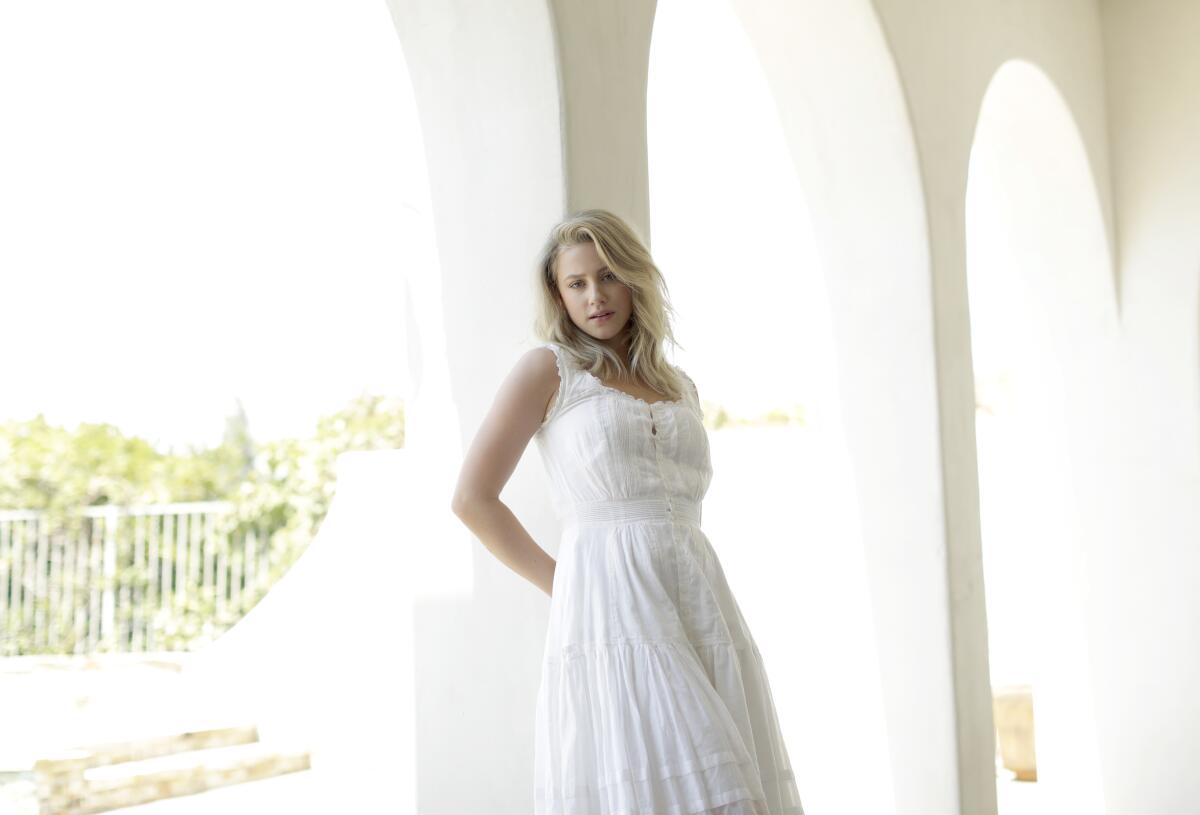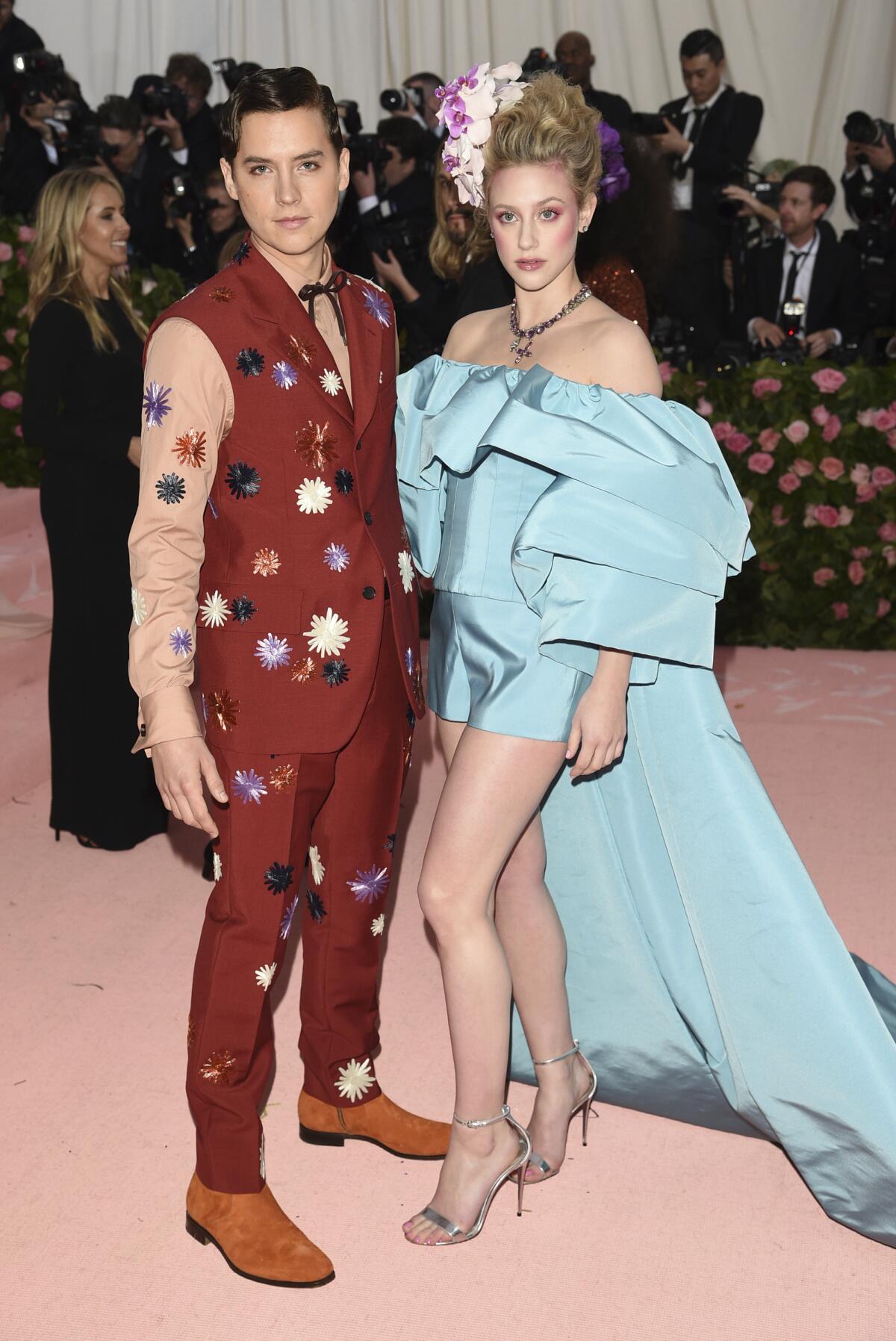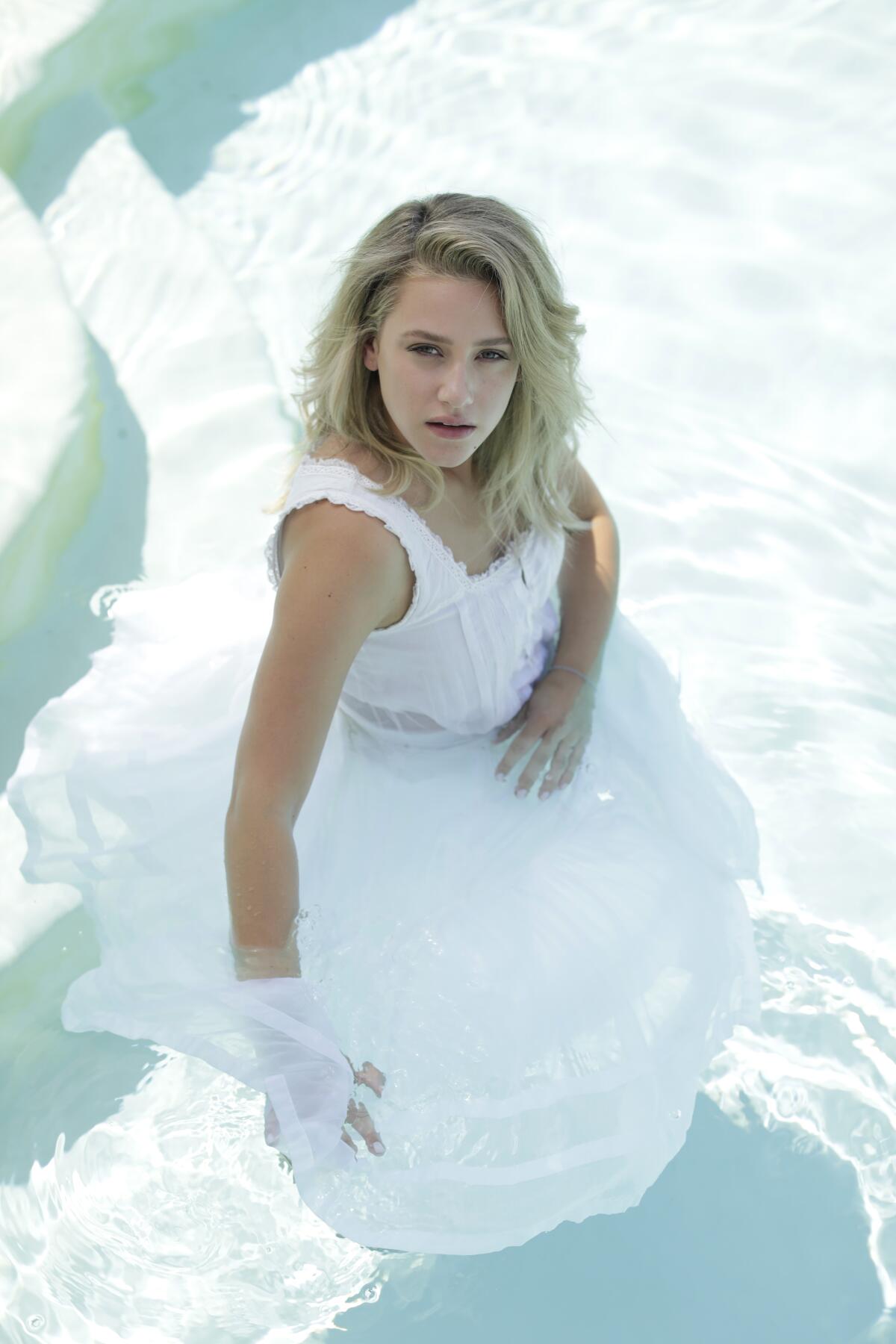Lili Reinhart isn’t shy about depression, bisexuality and body image. But she has more on her mind

- Share via
This morning, Lili Reinhart woke up and read a headline about herself. It said that she’d broken up with her boyfriend, “Riverdale” co-star Cole Sprouse, and was so heartbroken that she felt like she was dying.
Then she got pissed. She and Sprouse had, in fact, split in March; the actor would confirm as much on Instagram a few days later. But she had yet to utter a word about the separation to the press.
So, sleep still in her eyes, she logged on to Twitter and said that her words had been used for “clickbait” — that she’d “never speak so candidly” about a private relationship. Even if she used to pose with Sprouse on magazine covers and walk the red carpet with him at the Met Gala.
But it can be difficult to draw those boundaries when you’ve established yourself as one of the most open young Hollywood stars. At 23, Reinhart speaks freely about her bisexuality, body image and mental health. She has weighed in when her colleagues have been accused of sexual harassment and racism. And over the next few weeks, she’s unveiling two intensely personal new projects: “Chemical Hearts,” a film for which she channeled her own battle with depression, and “Swimming Lessons,” her debut book of poetry.
With nearly 25 million Instagram followers — a product of her role as Betty Cooper on the CW’s “Riverdale” — she finds herself weighing her natural inclination towards transparency against the judgment of the public.
“This pandemic has been incredibly hard, and it’s hard to stay positive,” she admits. “I want to post sad songs on my Instagram just like everyone else does. But I hold myself back, because I know I have millions of people watching me who want to dig through every little thing I post and try to figure out the meaning behind it.”
Amidst the pandemic, Reinhart moved into her first house — what TMZ referred to as a $2.7-million “Spanish beaut” in Encino. That’s where she is today, surrounded by new furniture that doesn’t feel like hers yet. Her dog, Milo, is barking at the UPS delivery man. She’s wearing a Playboy T-shirt she bought from PacSun.
Since “Riverdale” shut down production in Vancouver in March, Reinhart has mostly spent her time alone here. She’s tried to look at quarantine as an opportunity — writing in her journal, learning how to meditate, meeting weekly with a therapist, reading self-help books.
“Obviously, I’m dealing with a lot of depression. So how do I find a light at the end of the tunnel?” she says. “I really wanted to go out of my way to find the root of it. Now, when I feel something come up, I let it come out. Because otherwise, it’s literally harming my body and my brain. Allow your body to feel what it feels. That is literally how you heal.”

Almost as soon as “Riverdale” thrust her into the spotlight in 2017, Reinhart revealed that she’d had depression since she was 13. Since then, it’s become something she feels fans identify her by — a responsibility she has mixed feelings about. As she writes in “Swimming Lessons”:
People wish for me to be this
trailblazing girl.
The one who has marked out a
path for others to follow
on how to be happy,
how to fight when your limbs feel broken.
Sometimes I feel like a fraud.
Which is partly why “Chemical Hearts” appealed to her so much. In the film — which is now streaming on Amazon, and on which she also serves as executive producer — she plays Grace, a high schooler grappling with the grief of surviving a car accident that killed her boyfriend. When she starts falling for a new boy (Austin Abrams), her sadness begins to overtake the fledgling relationship.
“I used a lot of my own inner turmoil,” Reinhart says of the role. “I don’t really describe myself as bubbly or joyful. I’m making myself out to be, like, the Grinch over here. But I’ve lived with depression for a long time now, so playing a girl who is clearly feeling somber and going through heartache and grief wasn’t so foreign to me. It wasn’t that hard for me to access.”
When she began work on the film in 2019, Reinhart had just wrapped a supporting turn in the female-empowerment stripper drama “Hustlers.” Though she’d had small parts in a few independent films before, “Hustlers” marked the first time people really saw Reinhart act outside of the soapy teen TV series. Opposite the likes of Jennifer Lopez, Constance Wu and Keke Palmer, she was memorable as a wide-eyed dancer who vomits any time she’s anxious. It was a comedic part, and director Lorene Scafaria says she liked Reinhart for it because, like the actress, the character “is seen as a pretty face, and if you’re not looking closely enough, you don’t see she’s really deep and soulful.”
“I met Lili right after Luke Perry passed away, so it was a really hard moment in her life,” recalls Scafaria, referring to the death of Reinhart’s “Riverdale” co-star. “In the moment, I wasn’t sure what part of that was her own personality or how much of it was circumstantial. I think the surprise with her is that she runs very deep. Her fan base might look at her and think she’s so beautiful and has a great life and all these gifts, so I think it’s so important that she does show the world what she goes through. I’m really proud of her for not presenting herself in a wine-and-roses way.”
Because of “Riverdale,” Reinhart has a lot of young fans. She says she doesn’t “want to come off as a bad role model” to them, so she doesn’t promote drinking alcohol in her personal life and tries not to curse on her Instagram stories. Richard Tanne, the director of “Chemical Hearts,” says that since meeting her last year he constantly hears the actress mention “her fans and what they’re looking for.”
“I’ve heard her say ‘Oh, my fans are dying for the trailer, I wish we could speed it up a few days,’” he says. “She has a truly dedicated legion of followers, some of whom have a social media presence entirely devoted to her as a human being. I’m sure that back in the ‘90s, when Julia Roberts was becoming a huge star, there were people connecting to her in the same way that people are connecting to Lili. But I have to imagine that because of the accessibility of social media, there’s a more potent form of loyalty.”
It remains to be seen how strong that loyalty might be as Reinhart inevitably transitions away from “Riverdale.” Like her co-stars Sprouse, Charles Melton and KJ Apa, her first starring movie role is coming in the form of a young romance. This makes sense to her: The show does, after all, position them as “romantic leads — hot, young teenagers who are horny and ready for love.” But she says her film ambitions are actually quite serious. She’d love to model a career after Tilda Swinton, a “chameleon” who she admires for always showing a different side of herself on screen.
“I would like people to start seeing me as a film actress,” Reinhart acknowledges. “I want people to see me and know: ‘Hey, I’m in this for the long haul.’ This is a career for me. I’m not just gonna be on ‘Riverdale’ for five years and then disappear.”
For now, though, Reinhart is still on “Riverdale,” which will soon enter its fifth season. She flew back to Canada this past weekend, where she and her cast mates will have to stay until Christmas due to COVID-19 traveling restrictions. The last five months marked the longest the cast has ever been apart, a period during which many of them also weathered controversy.
In June, Vanessa Morgan tweeted that she was “tired of how Black people are portrayed in the media,” implying that her “Riverdale” character Toni Topaz was one of the roles “being used as side kick non dimensional characters to our white leads. Or only used in the ads for diversity but not actually in the show.” The show’s creator, Roberto Aguirre-Sacasa, issued a public apology and vowed to “do better to honor her and the character she plays. As well as all of our actors and characters of color.”
Reinhart, who said she’s “grown closer” with Morgan through the phone in recent months, said Aguirre-Sacasa called the entire cast after his posts in an effort to “make sure we all felt comfortable.”
“I mean, the show historically has been pretty white,” Reinhart says. “Roberto is very conscious of it now to make sure that that doesn’t happen again and Vanessa doesn’t feel that she’s put in that position again. I feel as a producer now moving forward how important it is that I’m not stereotyping, stereocasting anything — really making sure I’m going out of my way to do right by Black people, by transgender people, by people who don’t look like me.”
A couple of weeks after Morgan spoke out, she and other “Riverdale” stars came under fire when anonymous Twitter accounts accused her, Sprouse, Reinhart and Apa of sexual abuse. Some of the tweets were later deleted, while some of the nameless accounts admitted they had been lying. Even though Reinhart “knew this person was lying,” she was also worried about how to respond to the allegations because she didn’t want to “victim-shame.”
“It’s a twisted world we live in, because it takes so much for someone to come forward about something they’ve been through, and especially to name their abuser,” she said. “So when people do that falsely, it hurts the entire movement. It just makes us go back, like, 7,000 steps. It’s so discouraging.”
She ultimately decided to tweet about the allegations in an attempt to shut them down — largely because “as someone who has experienced sexual coercion myself, I wasn’t going to sit there and have someone falsely accuse me.” In 2017, after victims of Harvey Weinstein first began to come forward publicly, Reinhart took to her Tumblr account to write about a negative experience she’d had in the industry when she was 16. In her post, she wrote about how a “significantly older” colleague on a project who was in a “position of power over [her]” tried to force himself on her. Looking back, Reinhart says, she wishes she hadn’t written about the experience when she was “still trying to wrap [her] brain around it.” She doesn’t plan on naming the individual because “this person is irrelevant anyway, so it’s not like I’d be taking down their career.”
“And that person told me it didn’t happen,” she says. “I didn’t want to be invalidated. So I think in choosing to not name them, I knew they weren’t going to come back at me trying to defend themselves. I could just tell the story as it was.”
Tumblr was also where Reinhart first began to share her poetry, which will be published by St. Martin’s Griffin on Sept. 29. She began writing poetry when she was 16, first taking bits of diary entries and expanding upon them. She developed an affinity for poets like Lang Leav who write in “cute little paragraphs,” finding comfort in words from others she felt had similar depths of emotion. Now, she writes her poems in the Notes app on her iPhone, and has already completed an additional 100 since finishing “Swimming Lessons.”
Readers of the book will no doubt parse Reinhart’s poetry as they do Taylor Swift’s lyrics, searching for coded references to Sprouse. Some of them more blatantly refer to her ex, like a poem about the “flushed faces” of the fans with “trembling hands” who want to be close to the man who she knows “better than anyone in the world.” Others — about a girl who overlooked cheating because she “craved passionate, overwhelming euphoria” — are more oblique.
“Some of them are obvious for a reason, because I’m not badmouthing someone,” Reinhart says. “I was speaking very fondly of someone I was in love with. I don’t feel any shame from it. People will 100% read between the lines, make their own conclusions — that’s fine. I’m not going to encourage it, but I’m going to say that a lot of the poems were coming from emotion rather than an actual event.”
The publication of “Swimming Lessons” will no doubt force Reinhart to further examine her relationship to the public, who she alternately seems torn between pleasing and ignoring. Earlier this year, for instance, she revealed on Twitter that she felt insecure about her body next to her “perfectly chiseled” co-stars. She says she did it because she wanted to show her fans that unlike some actors — many of whom she has witnessed not eating for 12 hours before they appear scantily-clad on-screen — she has an “average” body.
“I don’t have the CW girl body — tiny waist, nice-shaped legs, skinny, small, tiny,” Reinhart says now. “I had to do a bra and underwear scene in this last season and I felt really insecure about it. I really, really didn’t want to do it. I didn’t tell anyone this. I wasn’t pressured into doing it. I did it because it was my job. But I felt bad about myself doing it. I really did. And this is where it gets complicated. I can’t preach body positivity if I don’t practice it. So even if I’m not feeling amazing about my body, I felt it was important for me to do the scene anyway in my bra and underwear so people could see my body as it was. I did it for the people who feel like they need to look a certain way.”

But when it comes to the trolls who “hide behind a fake Twitter account and call [her] fat,” Reinhart grows angry. She says she doesn’t respect anyone who comments on another’s body, and would never take the opinion of “such a bottom-feeder” seriously.
“You go on Instagram, and I’m like, ‘Oh, look, all these people with these beautifully toned bodies’ and then go to the beach — does anyone on the beach in the real world look like that? I don’t see anyone looking like this. Instagram and Victoria’s Secret runways are not a portrayal of how people look in real life.”
But Instagram is also where Reinhart has gone to reveal some of the most private things about herself. In June, she used the platform to come out as a “proud bisexual woman” — something she says she decided to share almost on a whim. Growing up in Ohio, Reinhart says she first questioned her sexual orientation when she was in the fifth grade while waiting at the bus stop.
“I thought: ‘Do I like girls? I don’t know,’” she recalls. “As I’ve gotten older, the answer has become ‘Yes. Clearly, I do.’ ... I think I just felt at this point in time: Why not? If suddenly I started dating a girl publicly, I didn’t want people to be, like, what the ...?
“Not that I would even owe anyone an explanation. Because I don’t.”
More to Read
Only good movies
Get the Indie Focus newsletter, Mark Olsen's weekly guide to the world of cinema.
You may occasionally receive promotional content from the Los Angeles Times.











